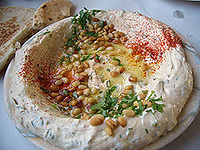Humous,
The word comes from Arabic: حمّصḥummuṣ[ ‘chickpeas’. Like many other Arabic loanwords and names, romanized spellings of the word in English can be inconsistent. The earliest use of the word hummus in English as noted by the Oxford English
Among the common spellings for this word as transliterated into English are hummus, hommos and hoummos. The spelling humus is generally avoided in English as it is a homonym of humus (organic matter in soil), though this is the usual Turkish spelling and the OED indicates the word entered the English language from Turkish. The full Arabic name of the prepared spread is حُمُّص بطحينة (ḥummuṣ bi tahina) which means chickpeas with tahini.
Historical origins
Many cuisine-related sources carry forward a folklore which describes hummus as one of the oldest known prepared foods with a long history in the Middle East stretching back to antiquity, but its historical origins are unknown. The historical enigma is such that the origins of hummus-bi-tahini could be much more recent than is widely believed. One of the earliest verifiable descriptions of hummus comes from 18th-century Damascus and the same source claims it was unknown elsewhere.
Meanwhile some cookbooks repeat the legend that hummus was first prepared in the 12th century by Saladdin. Sources such as Cooking in Ancient Civilizations by Cathy K. Kaufman carry speculative recipes for an ancient Egyptian hummus, substituting vinegar for lemon juice, but acknowledge we do not know how the Egyptians ate their chick-peas. Similarly, no recipe for hummus has been identified among the many books on cooking surviving from ancient Rome.
Charles Perry, co-author of Medieval Arab Cookery notes that owing to hummus bi tahina being an everyday staple, and because of the lack of Arab recipe books published between the 14th and 20th centuries, no recipes documenting this food’s early ingredients have been found. He says the nearest medieval example recorded in a 13th century Arab cookbook, Kitab Wasf al-Atima al-Mutada is Hummus kasa, which substitutes vinegar for lemon, includes extra herbs and adds walnuts.
It is known that the Lebanese cuisine expanded on many of these traditions and added the various flavors of this amazing dip, creating a variety and additions like meat, pine nuts and other toppings to the dish.
